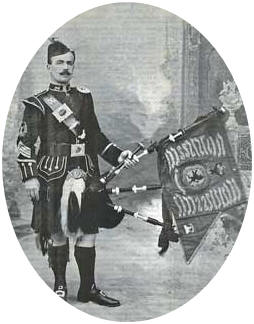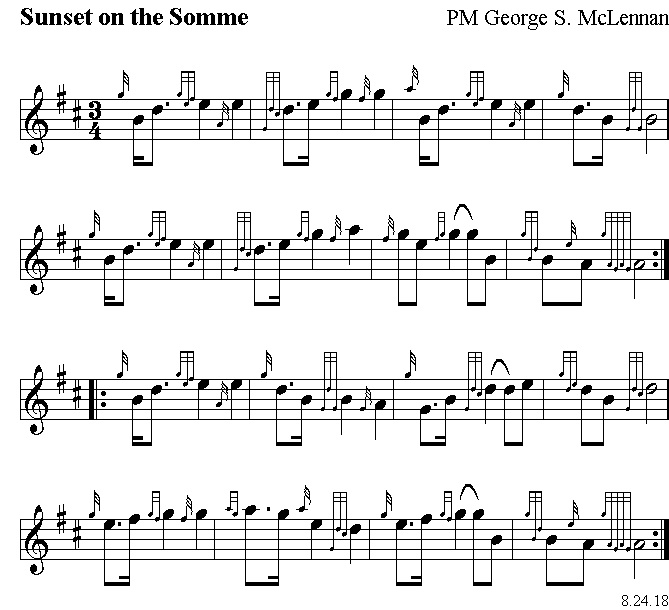|
The Battle of the Somme, fought in the
summer and autumn of 1916, was one of the largest battles of the
First World War. With more than one million casualties, it was
also one of the bloodiest battles in human history. The Allied
forces attempted to break through the German lines along a
25-mile (40 km) front north and south of the River Somme in
northern
France. One purpose of the battle was
to draw German forces away from the Battle of Verdun; however,
by its end the losses on the Somme had exceeded those at Verdun.
While
Verdun would bite deep in the national consciousness
of France for generations, the Somme would have the same effect on generations of
Britons. The battle is best remembered for its first day, 1 July
1916, on which the British suffered 57,470 casualties, including
19,240 dead to this day the bloodiest day in the history of
the British Army. As terrible as the battle was for the
British Empire troops who suffered there, it
naturally affected the other nationalities as well. One German
officer famously described it as "the muddy grave of the German
field army." By the end of the battle, the British had learnt
many lessons in modern warfare, while the Germans had suffered
irreplaceable losses. British historian Sir James Edmonds
stated, "It is not too much to claim that the foundations of the
final victory on the Western Front were laid by the
Somme
offensive of 1916.
Sunset on
the Somme was composed by Piper Major George S. McLennan.

Pipe Major George
Stewart McLennan (9 February 1883 - 31 May 1929) was a Scottish
bagpipe player. He was a successful solo piper, as well as a
pipe major and composer.
He was born on 9 February 1883 at 105 St.
Leonard Street, Edinburgh, to John and Elizabeth (née Stewart)
McLennan, the eighth of their nine children (one of whom died in
infancy). Many of his ancestors on both sides of the family were
prominent pipers. George's father John was the first to use the
spelling McLennan; his predecessors had used the spelling
MacLennan.
George's mother Elizabeth died when he was
young, and his father remarried a widow with two children and
subsequently had three more children with her. Among his
half-siblings was Gold Medal winner Donald Ross McLennan. George
suffered from polio as a child, and could not walk until the age
of four and a half.
McLennan began receiving piping tuition
from his father at the age of four, and later received tuition
from his uncle Pipe Major John Stewart, and in Highland dancing
from his cousin William McLennan. He made rapid progression,
winning the Amateur National Championship at the age of nine,
and was invited by Queen Victoria to play for her at Balmoral
Castle.
His father enlisted him in the Gordon
Highlanders in October 1899 in order to prevent him from joining
the Merchant Navy, and he became Pipe major of the 1st Battalion
in 1905, one of the youngest ever in the British Army.
McLennan was successful in solo
competitions, and won the Gold Medal at the Argyllshire
Gathering in Oban in 1904 and at the Northern Meeting in
Inverness in 1905, and the Clasp at Inverness for former winners
of the Gold Medal in 1909, 1920 and 1921. McLennan had a close
friendship and competitive rivalry with Willie Ross, and he
travelled to competitions and shared prize money with William
Lawrie.
He married Nona Lucking on 3 April 1912,
and together they had two sons, George (19141996) and John
(19161940), who both became pipers with the Gordon Highlanders.
McLennan was posted at the depot in
Aberdeen until 1918, when he was sent to the Western Front to
succeed Pipe Major Tom Henderson who had been killed. In May
1918 he collapsed and required fluid to be drained from his
lungs in a field hospital. When the war ended he was posted back
to Aberdeen, and after he was discharged in 1922 he started
working in Aberdeen as a bagpipe maker, at a shop at 2 Bath
Street. At the time there were several other prominent musicians
in the city, including fiddler James Scott Skinner.
He died on 31 May 1929 of lung cancer
after a long period of ill health connected to the makeshift
operation. 20,000 people lined the route of the procession to
Aberdeen station at his funeral on the 4th of June, before he
was interred at Newington Cemetery in Edinburgh.
George McLennan used to speak of the
sunsets he occasionally saw while in the trenches with the first
Battalion. He expressed this in the tune, Sunset on the Somme
the sun slowly dying to cover the horrors of the day.

|



